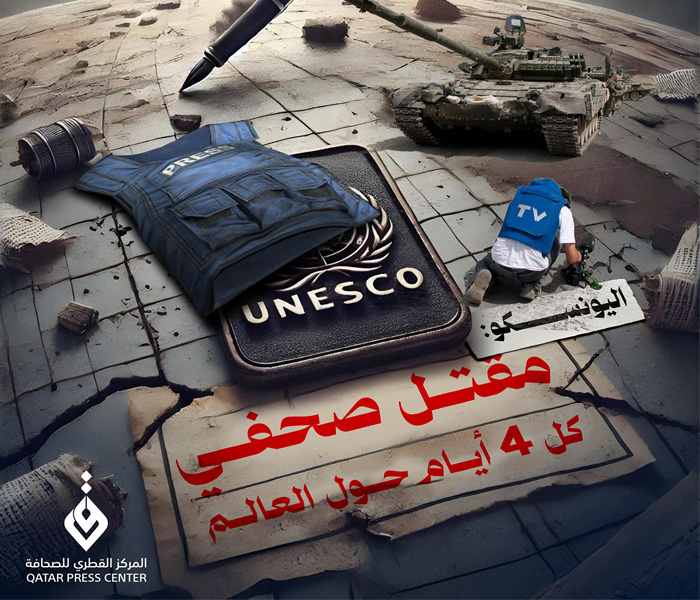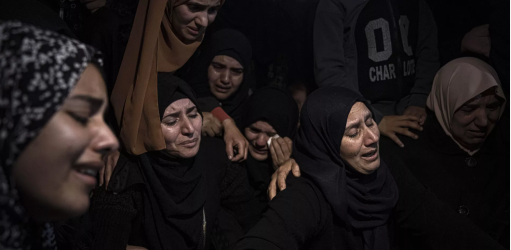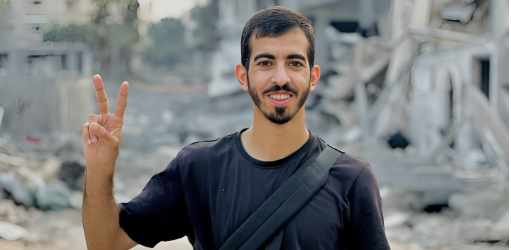This is a notification message.

Doha - November 9, 2024:
In its annual report, UNESCO has documented an increase in the number of journalists who lost their lives while carrying out their work in recent years.
The report's statistics reveal that one journalist is killed every 4 days worldwide over the past two years, simply for pursuing the vital duty of truth-seeking.
UNESCO and various UN organizations have called on governments worldwide to take serious measures to protect journalists and combat impunity, implementing fair and swift investigative mechanisms for crimes against journalists to ensure people’s right to access information and freedom of expression.
Audrey Azoulay, UNESCO’s Director-General, stated: “During 2022 and 2023, a journalist was killed every 4 days merely for fulfilling their critical work in pursuit of the truth, with no accountability in the vast majority of these cases.” Azoulay urged all member states of the international organization to intensify efforts to prevent impunity for these crimes, emphasizing that prosecuting and convicting perpetrators is essential to prevent future attacks on journalists.
The UNESCO report, released this year on the International Day to End Impunity for Crimes Against Journalists, highlights a 38% increase in journalist murders compared to the previous report, marking the deepest setback to journalist safety in years.
According to the report, 162 confirmed journalist killings occurred in 2022 and 2023, with more than half taking place in conflict zones. The occupied Palestinian territories topped the list as the most dangerous country for journalists in 2023, with 24 targeted killings (with international organizations estimating the number of journalist martyrs since the start of the aggression on Gaza at 181). Meanwhile, Mexico recorded the highest rate in 2022, with 19 murders, and Latin America and the Caribbean, along with Arab states, accounted for the most journalist deaths.
The report also noted that many journalists who died in non-conflict countries were killed while covering organized crime, corruption, or protests, highlighting the broadening risks facing media workers. The report underlined the role of impunity in exacerbating these risks, with around 85% of crimes against journalists going unpunished, compounding the challenges to freedom of expression and media safety globally.
The crisis of journalist killings, particularly in Gaza, dominated the UN’s 2024 International Media Seminar on Peace in the Middle East. Al Jazeera reported UN Secretary-General António Guterres stating that journalist fatalities in Gaza have reached "unprecedented levels," calling for firm measures to protect journalists and ensure accountability for those responsible for these crimes.
Guillermo Cano, head of UNESCO's Freedom of Expression and Journalists’ Safety section, expressed concern over the rising number of journalist deaths in conflict zones, particularly amid increased incitement against the media. He urged stronger international support to protect journalists and hold perpetrators accountable, highlighting the media's crucial role in defending democracy and human rights.
UNESCO’s report also introduced new tools for prevention and recovery, emphasizing the organization’s commitment to anti-impunity efforts with its annual awareness campaign on this issue, launched under the slogan "There’s a Story Behind the Story" to be featured in global newspapers.
Additionally, UNESCO organized a global conference on journalist safety during crises and emergencies in collaboration with the African Union in Addis Ababa, which reviewed national mechanisms for journalist safety, covering 56 national protection mechanisms and at least 12 national action plans. UNESCO also plans to publish a guide for psychologists working with journalists in crisis situations, in partnership with the International Women’s Media Foundation. This guide aims to equip psychologists with practical tools for providing immediate psychological support during crises, with particular attention to the needs of women journalists, ensuring emotional and cognitive stability, and empowering journalists to make rational decisions necessary for their survival while reducing impulsive actions that may increase risk.

تستقبل نساء غزة يوم الأم...

تواصل الآلة الإعلامية الإسرائيلية حربها...